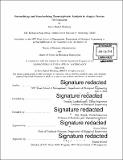Streamlining and standardizing transcriptomic analysis in Amgen process development
Author(s)
Weinberg, Kerry Rachel
DownloadFull printable version (8.158Mb)
Other Contributors
Leaders for Global Operations Program.
Advisor
Douglas Lauffenburger and Roy Welsch.
Terms of use
Metadata
Show full item recordAbstract
Building biological understanding of the Chinese Hamster Ovary (CHO) system used to manufacture therapeutic proteins is paramount to efficient CHO bioprocess optimization. This understanding can be built by analyzing and synthesizing biological data; such as transcriptomic (gene expression), proteomic (protein levels), or metabolomic (metabolite levels). This thesis describes a streamlined workflow for analyzing transcriptomic data. This streamlined workflow not only reduced the barrier to conducting the analysis but also reduced the analysis cycle time. With the use of this workflow, a number of historical Amgen microarray datasets were mined to identify gene expression signatures indicative of productivity. The result of this mining identified key biological pathways specific to a highly productive Amgen cell line. This work suggests that these pathways are critical to heightened levels of protein production. Using this information to engineer future cell lines could enable Amgen to improve cellular protein production by over 30%, impacting costs associated with drug substance manufacturing. More broadly, this example of streamlining and standardizing transcriptomic data provides a framework for how Amgen Process Development can leverage biological data to improve CHO systems understanding and achieve operational impacts.
Description
Thesis: M.B.A., Massachusetts Institute of Technology, Sloan School of Management, 2016. In conjunction with the Leaders for Global Operations Program at MIT. Thesis: S.M. in Engineering Systems, Massachusetts Institute of Technology, Department of Biological Engineering, 2016. In conjunction with the Leaders for Global Operations Program at MIT. Cataloged from PDF version of thesis. Includes bibliographical references (pages 71-75).
Date issued
2016Department
Leaders for Global Operations Program at MIT; Massachusetts Institute of Technology. Department of Biological Engineering; Sloan School of ManagementPublisher
Massachusetts Institute of Technology
Keywords
Sloan School of Management., Biological Engineering., Leaders for Global Operations Program.